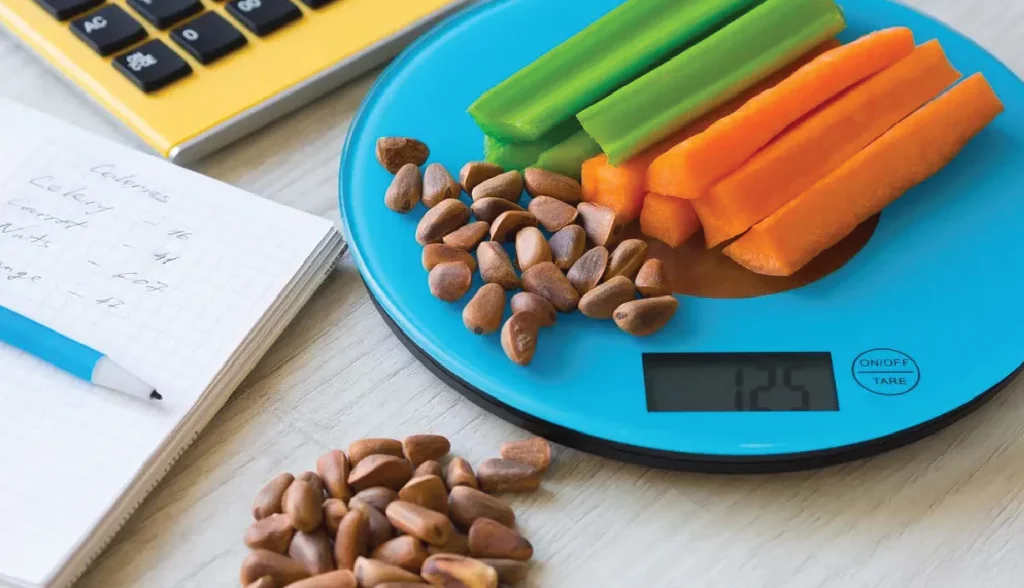
Let’s discuss what “weight loss” means.
A reduction in total body mass, caused by a mean loss of fluid, body fat or adipose tissue, and/or lean mass, such as bone mineral deposits, tendon, muscle, and other connective tissue, is referred to as weight loss. It may happen accidentally due to an underlying illness or result from a deliberate effort to treat an actual or imagined overweight or obese state.
b) Intentional weight reduction is the loss of total body mass due to attempts to change one’s look by slimming down or improving fitness and health.
Are you aware of the appropriate height-to-weight ratio for you?
Consider performing a fast check to see whether you are already at your target weight. It’s simple to use this weight loss calculator. Enter your age, height, current weight, ideal weight, and projected completion date. You can use the calculator to get precise figures and a weight loss chart to help you understand how calorie intake affects weight loss.
What types of weight loss are there?
A person can deliberately lose weight for personal motives, such as to appear nice. Following a particular diet and weight loss regimen results in what is known as deliberate weight loss. On the other hand, unintentional weight loss is when someone loses weight over a period of 6–12 months without intending to because of certain underlying medical conditions.
Use a weight loss calculator to determine how many calories you should consume daily to reach your goal weight.
It should be emphasised that reducing calories is preferred to reach a healthy weight. It is NOT advised to go to great lengths to reduce weight when you are already a healthy weight in order to conform to social stereotypes.
How to quickly lose weight – To lose weight, how many calories should you consume each day?
You must ensure that the number of calories you burn each day exceeds the number of calories you consume daily since calories are nothing more than units of energy.
- Establish realistic goals for weight loss
The first thing to remember is that fad diets and food restrictions are the worst strategies for losing weight. Setting a goal that can be accomplished is crucial. First off, a healthy objective that is attainable is decreasing 5–10% of your body weight. Set short-term, precise goals, such as moderate exercise and half-hour walks.
- Know your caloric intake
3,500 calories equal one pound. Setting a daily calorie goal of 500 will help you reach your goal of losing a pound in a week. Keep in mind that every calorie matters. So begin monitoring your daily calorie consumption.
- Have a nutritious breakfast.
A hearty breakfast can help you feel less hungry throughout the day. Avoid eating a small breakfast or missing it completely. A nutritious breakfast boosts your metabolism throughout the day.
- Little meals all day long.
Avoid starving yourself because doing so slows down metabolism and makes it harder to burn calories. In order to avoid overeating, eat every 3 to 4 hours during the day.
- Consume smaller portions from smaller dishes.
Using smaller plates can cut your consumption by 30%. Consuming lesser servings also helps. If you are serious about losing weight, using portion control plate is a fantastic place to start.
- Eat home-cooked meals
Meals made at home typically include little sugar. Make time to go shopping, select your ingredients, and cook wholesome meals in the convenience of your home. To reduce your intake of extra calories, limit your consumption of processed foods and restaurant meals.
- Observe the chewing rule when eating.
Eating slowly will facilitate digestion and increase basal metabolic rate, which may facilitate calorie burning. You get a psychologically full feeling from eating slowly as well.
- Mindful eating
Given the fast-paced way of life, it is challenging to pay attention to what you consume on a regular basis. However, in order to feel mentally satisfied, you must taste your food. Pay attention to what you’re eating and make an effort to control any emotional food cravings.
- Observe what you consume
Avoid consuming calorie-rich liquids, including energy drinks, sweetened tea with caffeine, sugary juices, and sodas. Reduce your alcohol intake as well. Make simple drinking water a habit, or animate it with fresh lime.
- Diet & Exercise
The majority of what determines growth or loss is what you consume. However, it is challenging to operate when calorie intake is severely restricted. It is preferable to raise calorie expenditure if you have already cut your daily calorie intake to 1,200 from 1,500. You’ll feel better after working out, and falling asleep at night will be simpler.
- Make it Fun
Most individuals will only stick with exercise if it’s exciting, unpleasant, or painful. Because of this, committing to join a gym or lose 10 pounds is a typical one that is swiftly forgotten by February every year. Make working out simple, convenient, and enjoyable, and you’ll stick with it.